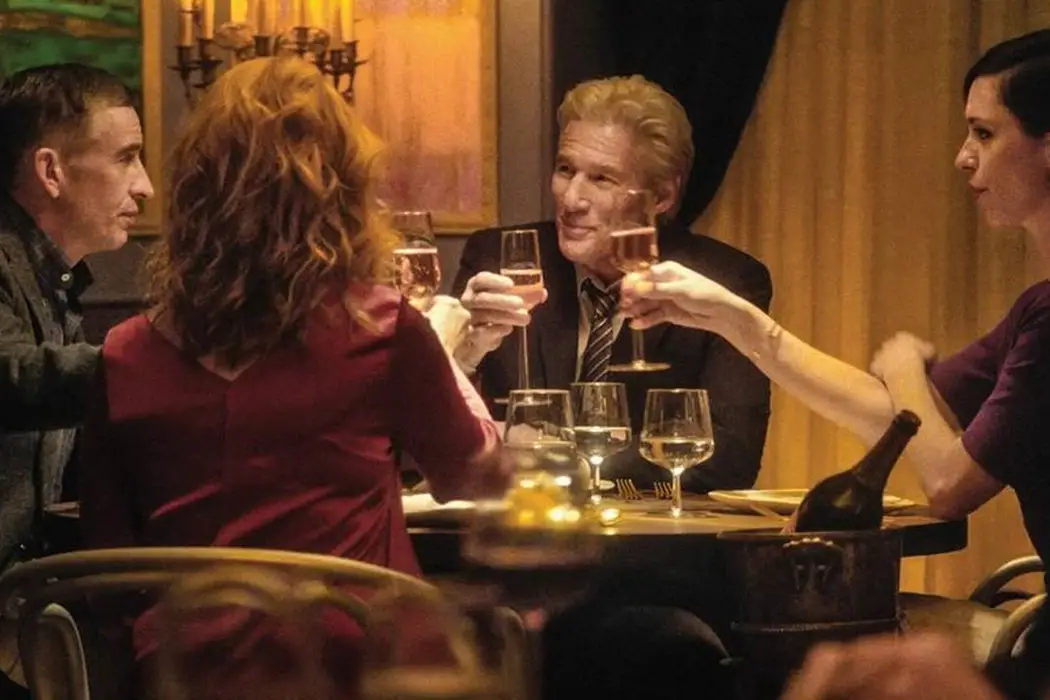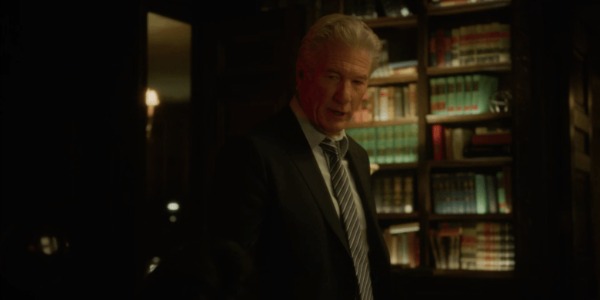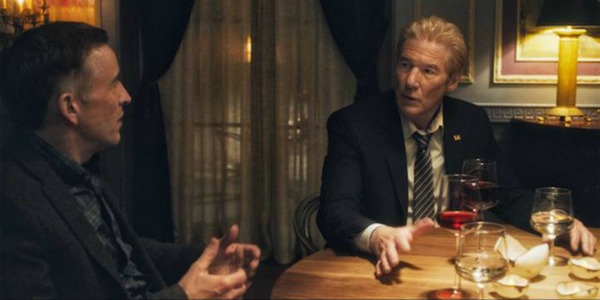THE DINNER: Coogan Delivers A Performance For The Ages

Alex Arabian is a freelance film journalist and filmmaker. His…
Filmmaker Oren Moverman is no stranger to intense subject matters. He has consistently proven that he can handle difficult themes and subject matter with ease. The Tel Aviv, Israel native was the mastermind behind The Messenger (2009), a film which catapulted Ben Foster into superstardom for his portrayal of a soldier assigned to give the unfortunate news of United States Army soldiers’ deaths to their families. His follow-up, Rampart (2011), reunited him with Woody Harrelson, who brought an uncomfortable humanity to a racist, corrupt police officer. To say the least, Moverman knows how to bring out the best in a lead actor. In this case, it is Steve Coogan who astounds in The Dinner.
The Dinner marks Moverman’s fifth directorial effort, 12th screenplay, and his most uncomfortably tense “thriller” yet. Though the screenplay is an adaptation of Herman Koch’s acclaimed novel, it appears Moverman might have added too many of his own themes into the story, creating a disjointed and ideologically overloaded plot that almost physically exhausts the viewer at times.
The Dinner’s Thematic Reach Far Exceeds Its Grasp
The predominant theme in The Dinner is as follows: The American Civil War never ended. This glimpse into middle-American suburbia is an anxiety-inducing experience. Although Moverman intends the anxieties expressed onscreen to be transposed onto the audience the way they are conveyed in the novel, oftentimes the anxiety comes from too many of his half-baked ideas instead.
Paul (Coogan) is reluctant to attend the titular dinner with his Congressman brother, Stan (Gere), and his sister-in-law Katelyn (Hall), yet his wife Claire (Linney) insists they attend. What unfolds is a truly horrifying revelation during the various conversations they have over this fateful dinner. The two couples, connected by a horrific crime committed by their children, are pulled into a moral dilemma of dealing (or not dealing) with the consequences of the crime, thus introducing another theme of moral ambiguity.

To answer the question you’re all asking yourselves, the two sons from either family light an African-American homeless woman on fire after a typical high school party, murdering her in cold blood as they watch, laughing and filming the act without an ounce of remorse. Stan’s adoptive son from a previous marriage with Barbara (Sevigny), Beau, who is also African-American, refuses to partake in the act. The video surfaces on social media, prompting the “dilemma” for the parents.
It is necessary to point out race in this instance, because Moverman heavy-handedly confronts racial constructs throughout the film. The cast is predominantly, intentionally white, and their ostensibly banal racism is a theme that is magnified towards the film’s climax. Paul even goes so far as accusing a 10-year-old Beau during one of the flashbacks for pulling the race card. In reality, Beau was systematically verbally and physically abused by his white siblings, while his parents let it happen.
This negligent parenting and obliviousness of the characters’ own prejudices serve as the metaphorical crimes in the film. They are among the most intriguing but, ironically, least-developed themes in The Dinner. Furthermore, instead of meandering through flashback subplots such as Claire’s cancer and remission, Barbara’s unknown past and departure from the family, and occasions when one of the sons showed violent tendencies, Moverman would have been better off picking one of these character arcs to hash out and relate it to the story in a more cohesive way.
Moverman Fumbles With His Best Ensemble Yet
Given its predominantly singular setting in a restaurant, The Dinner unfolds as a tragi-comic stage-play of sorts, focusing solely on the actors’ performances. With Richard Gere, Laura Linney, Steve Coogan, Rebecca Hall, and Chloë Sevigny, Moverman found what is likely his best ensemble cast to work with yet.

Moverman uses the courses of the restaurant’s dinner menu to announce the film’s acts, trying to correlate (or contrast) the beautiful artistic layout of the food with The Dinner’s less palatable subject matter. Although this entanglement of food and thought is an intriguing idea, it is not the first, nor the best film to tie the two together. Better examples can be seen in Stanley Tucci’s Big Night and Bryan Fuller’s singular masterpiece series, Hannibal, which deftly tackle what Moverman tried to accomplish in this film.
It is not clear whether Moverman was attempting to tackle comedic satire, or bluntly confront societal hypocrisies. His transitions between flashbacks and the present are choppy, often attempting to serve as narrative cues that don’t actually further the plot, muddling his tonally conflicted film.
Paul’s narration and inner thoughts provide comic relief at times. His introspective pessimism is entertaining, pointing out the absurdity of social constructs, the excesses of the upper-middle class in America, and a general dumbing down of a society filled with what he refers to as “apes.” This is funny, and Coogan’s neuroticism is perfect for this commentary, but it does’t seem to fit in the film as a whole. A story like this, filled with the brutality of several atrocious acts of violence and perturbing ignorance, has no room for comedy.
The Best Performance Of The Decade Goes To…
Even if Moverman wasted Coogan’s impeccable comedic timing in the context of this story, let us focus on Coogan’s Paul, because he is the only multi-dimensional character in The Dinner. Coogan gives far and away the single greatest performance of his career. It is as if Moverman made this film specifically for him, although only for him. Finally, he has found a role worthy of his dramatic range. He is the glue that holds the muddled plot together. His inner narrative serves as part insight for the viewer, and in part to portray his mental illness.
Though never explicitly stated in the film, Paul suffers from what is likely Borderline Personality Disorder, something he inherited from his and Stan’s mother. And yet, Moverman encourages the audience to laugh at the “quirks” and “idiosyncrasies” that Paul’s inner-suffering begets. Yet, Coogan doesn’t let this happen. His shockingly realistic mood swings hindering upon laughter and genuine tears demand serious attention from the audience. Paul is a former history teacher who lost his job when he verbally lashed out at his students for not paying attention during a lesson about Gettysburg, the battle that “ended” the Civil War.
Paul has a very particular view on where humankind stands in the context of history, explaining in various ways throughout The Dinner that it is selfish to reproduce in an overpopulated, declining world. To Paul, reproduction is simply an animal instinct to survive and multiply our species on a visceral, cellular level. Paul’s cynicism is pure irony, as he represents all of the things that he despises. He continuously blames everyone else, victimizing himself, accusing Stan of stealing his mother away from him and depriving him of a decent childhood. This outwardly projected feeling of resentment towards youth fuels Paul’s anger and heightens his subconscious racism towards Beau.

This victim complex perpetuates Paul’s pacifism to an almost nihilistic level. He hates almost everything except for his obsession with history and war. As the film progresses and the crime of murder is revealed, the audience learns more fully that his compromised mind does not have necessary tools to equip him for handling the issue. Coogan makes sure Paul is aware of his diminishing grasp on reality, but sells it by exuding an inner-conflict that shows him helpless in controlling this downward spiral, even when he isn’t spewing his thoughts onto the audience. The fact that Coogan is just as effective in scenes of silence (whether it be a subtle burrowed brow, lip curl, or worried expression), speaks volumes, pun intended.
The truth is, Paul does not know who he is, claiming to be intellectually superior while saying that history cannot compete with the likes of Facebook, Instagram, YouTube, Skype, Tinder, etc. He has a point. Sadly, history seemingly has no meaning to the youth of today. And that isn’t just a paradox in the film, it’s a paradox in the world we live in. History is becoming irrelevant, paving the way for it to repeat itself. The theme of technology as a form of isolationism (yet another Moverman addition) has become cliché in films of the last two decades, but Coogan articulates Paul’s viewpoints with ease and style.
It’s All About Coogan
There is no substance to the rest of the characters. The ignorance and deafening prejudice of both couples has no ultimate resolution or message in it. The children are conveyed as sociopathic monsters, which is counterproductive and problematic to Moverman’s intention of deconstructing American race relations. Furthermore, Coogan’s acting counterparts are underutilized for the most part, particularly Sevigny as Barbara, who is only briefly onscreen for a couple of flashbacks.
The Dinner ends rather abruptly during one of Paul’s breakdowns, but thankfully it did. As he’s rambling about the devolution of humans into “apes with phones,” Coogan loses himself completely in the role, bringing his cappolavoro to a captivating close, leaving the audience speechless in a palpable silence, relishing in its consumption of Paul’s emotional agony. The Dinner is a difficult film to watch, but it is worth seeing for Coogan’s revelatory performance alone.
Are you a Moverman fan? What’s your favorite film of his? Did you enjoy The Dinner? Do you think it will earn Coogan more dramatic work?
The Dinner was released in the US on May 5.
Does content like this matter to you?
Become a Member and support film journalism. Unlock access to all of Film Inquiry`s great articles. Join a community of like-minded readers who are passionate about cinema - get access to our private members Network, give back to independent filmmakers, and more.
Alex Arabian is a freelance film journalist and filmmaker. His work has been featured in the San Francisco Examiner, The Playlist, Awards Circuit, and Pop Matters. His favorite film is Edward Scissorhands. Check out more of his work on makingacinephile.com!













